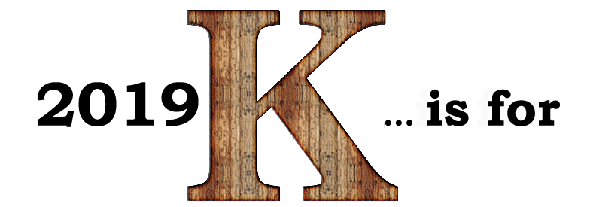The language of the law. Part Latin, part Greek, part law French, even part Anglo-Saxon. And all confusing.
Five days to go.
That’s what’s left for final preparations before one of genealogy’s great annual parties gets underway in St. Charles, Missouri.
Next Tuesday, May 7, the 2019 Family History Conference of the National Genealogical Society begins with some amazing special sessions — the all-day Putting Skills to Work workshop sponsored by the BCG Education Fund and two all-day seminars focusing on special research topics, an African American Seminar and an Irish Seminar.
And on Wednesday morning, May 8, The Legal Genealogist will kick off the full conference with an opening session: Journey of Discovery.
Five days to go.
So during those five days, and during the conference, time is at a premium, but we’ll try to keep the lights on here with more alphabet soup. And today’s word is going to sound really macabre.
The word for today is kill.

Yes, if you look in the legal dictionaries, it really does mean what you think it means: as a verb, it’s “to deprive of life; to destroy the life of an animal. The word ‘homicide’ expresses the killing of a human being.”1
But you know better than to think that I’d pick a word that had only one commonly understood definition, right?
So yes, there’s also another meaning for the word kill, this time as a noun. And there in the legal dictionary is its definition: “a Dutch word, signifying a channel or bed of the river, and hence the river or stream itself. It is found used in this sense in descriptions of land in old conveyances.”2
It’s because of the Dutch settlements in the 1600s in what was New Netherland and is now New York that so many towns and waterways there include kill as part of their names: Fishkill, Peekskill, Wallkill, Catskill, Spackenkill.3
And it’s not just New York, either. Remember that places like New Jersey and Delaware also had original Dutch settlers. Over in New Jersey, for example, there’s the Arthur Kill — a tidal strait separating Union and Middlesex Counties from Staten Island, New York4 — and the Kill Van Kull, another tidal strait in Hudson County New Jersey, connecting Newark Bay with Upper New York Bay.5
And you can certainly be forgiven if you’re a little taken aback by the name of one river in Delaware flowing out to Delaware Bay. The Murderkill. No, that still isn’t macabre. In Dutch, moeder means mother, and kill would be river, so Murderkill translates as mother river. The British added river to the name, so now it’s the mother river river.6
So there you have it. “To kill” may well be a crime. “A kill” is a creek or a river, used in place names and land descriptions anywhere the original settlers were Dutch.
Because the language of the law isn’t only “part Latin, part Greek, part law French, even part Anglo-Saxon. ”
It’s also part Dutch.
And still confusing.
Cite/link to this post: Judy G. Russell, “2019 alphabet soup: K is for…,” The Legal Genealogist (https://www.legalgenealogist.com/blog : posted 3 May 2019).
SOURCES
- Henry Campbell Black, A Dictionary of Law (St. Paul, Minn. : West, 1891), 678, “kill.” ↩
- Ibid. ↩
- See “What is a ‘Kill’ and Why Does New York Have So Many of Them?,” WRRV.com, posted 1 Mar 2017 (https://wrrv.com/ : accessed 3 May 2019). ↩
- Wikipedia (https://www.wikipedia.com), “Arthur Kill,” rev. 6 Apr 2019. ↩
- Ibid., “Kill Van Kull,” rev. 11 Apr 2019. ↩
- Robin Brown, “Delaware Backstory: The Murderkill River doesn’t have a grisly past,” The News Journal, Delaware Online, posted 4 February 2014, updated 2 May 2018 (https://www.delawareonline.com/ : accessed 3 May 2019). ↩



Would that also be the case for Kill Devil Hills, North Carolina, considering it’s surrounded by water?
Not according to the town history (quoting from PilotOnline.com: “Perhaps the most plausible explanation – and the one the town officially endorses – stems from rum-carrying ships that sometimes ran aground off the treacherous barrier islands during Colonial days.
In 1728, William Byrd of Virginia, hardly a fan of Carolinians, wrote that “Most of the Rum they get in this Country comes from New England, and is so bad and unwholesome, that it is not improperly called ‘Kill-Devil,’ and there is a story that the ship loaded with this ‘Kill-Devil Rum’ was wrecked opposite the sand hills, thus accounting for the name,” according to Stick’s book.
The town’s Visitor’s Guide skips the smarmy comments from Byrd and just says the shipwrecked rum, later scavenged by locals and stashed in the dunes, “was strong enough to ‘kill the devil.’ ” And the name stuck.”
Don’t forget the Schuylkill River in eastern Pennsylvania!
https://en.wikipedia.org/wiki/Schuylkill_River
Gosh darn, missed this one, and glad I decided to scroll through this morning. In parts of Vermont and eastern NY there is an old joke. There were people here before the settlers, of course. To the native folks who lived in our part of Vermont, a river was “batten”. So the Dutch came along, pointed at the river and asked “What do you call that?”
“Batten.”
“Oh, ok. Batten Kill.
Then the English came along and took over. They asked the Dutch, “What do you call that?”
“Batten Kill.”
“Ah. Batten Kill River.”
And that’s how we came to have a river those name is River River River.
Somebody messed it up though. They, in an admirable attempt to remember the Dutch settlers who came before the English, decided is was appropriate to call the river just Batten Kill. Which honored the Dutch, but pretty much overlooked the natives – because most people just assume that “batten” is a dutch word. That’s why we like our joke so much- it’s a reminder that there were others here before the Dutch, and that despite attempts to erase them and their language, they are still here.
I love this!!! The River River River!!!